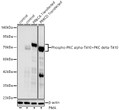| Host: | Rabbit |
| Applications: | WB/ELISA |
| Reactivity: | Human |
| Note: | STRICTLY FOR FURTHER SCIENTIFIC RESEARCH USE ONLY (RUO). MUST NOT TO BE USED IN DIAGNOSTIC OR THERAPEUTIC APPLICATIONS. |
| Clonality : | Monoclonal |
| Clone ID : | S5905RM |
| Conjugation: | Unconjugated |
| Isotype: | IgG |
| Formulation: | PBS with 0.05% Proclin300, 0.05% BSA, 50% Glycerol, pH 7.3. |
| Purification: | Affinity purification |
| Concentration: | Lot specific |
| Dilution Range: | WB:1:1000-1:3000ELISA:Recommended starting concentration is 1 Mu g/mL. Please optimize the concentration based on your specific assay requirements. |
| Storage Instruction: | Store at-20°C for up to 1 year from the date of receipt, and avoid repeat freeze-thaw cycles. |
| Gene Symbol: | PRKCDPRKCA |
| Gene ID: | 55805578 |
| Uniprot ID: | KPCD_HUMANKPCA_HUMAN |
| Specificity: | A synthetic phosphorylated peptide around T410 of human PRKCZ (NP_002735.3). |
| Immunogen Sequence: | TTSTFC |
| Tissue Specificity | |
| Alternative Antibody Names | Anti-Protein Kinase C Delta Type antibodyAnti-Tyrosine-Protein Kinase Prkcd antibodyAnti-Npkc-Delta Cleaved Into - Protein Kinase C Delta Type Regulatory Subunit - Protein Kinase C Delta Type Catalytic Subunit antibodyAnti-Sphingosine-Dependent Protein Kinase-1 antibodyAnti-Sdk1 antibodyAnti-PRKCD antibodyAnti-PKCD antibodyAnti-Protein Kinase C Alpha Type antibodyAnti-Pkc-A antibodyAnti-Pkc-Alpha antibodyAnti-PRKCA antibodyAnti-PKCA antibodyAnti-PRKACA antibody |
Information sourced from Uniprot.org








